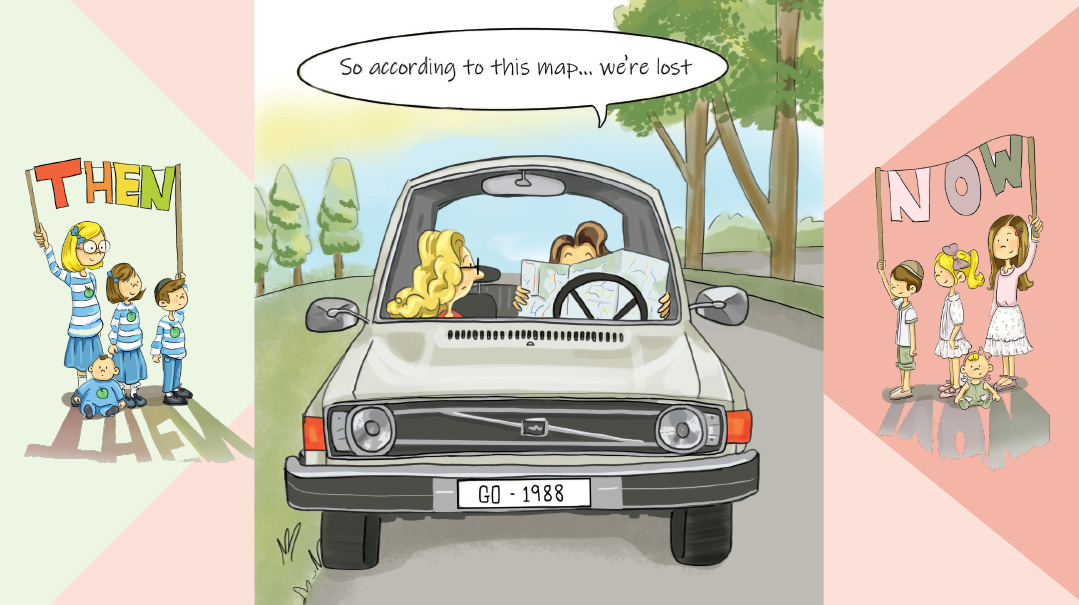Positive Charge
| January 17, 2023Mrs. Rachel Zlotowitz was a model of emunah and generosity, able to find the good in every situation and every individual

You didn’t need to speak to Mrs. Rachel Zlotowitz for more than 60 seconds to realize that you were in the presence of someone truly extraordinary. She was regal and approachable, all at the same time. She was an educated woman and impeccably turned out, but the emunah and temimus she radiated could light up an entire room. Just talking to her was a delight and a privilege, and yet she made it clear that she felt honored to be speaking with you. Her warmth and ability to find the good in every situation and every individual, enriched the lives of those who were fortunate enough to make her acquaintance.
Learning by Example
Growing up in the 1940s in East New York, it was clear that there was something special about the girl who would grow up one day to become Mrs. Faige Rachel Zlotowitz. The daughter of Chaim Chaikel and Chaya Schulman, Faigie, as she was known then, was raised in a home where emunah and bitachon permeated the walls, and where the words “gam zu l’tovah” were an oft-repeated mantra. While shemiras Shabbos wasn’t a given for many in America back then, the holiest day of the week was nonnegotiable in the Schulman home. When the family moved to Flatbush, Reb Chaim Chaikel joined Rav Avigdor Miller in his Kings Highway “Shabbos parades,” cajoling Jewish shopkeepers to close their stores for the day.
Expressions of gratitude to the Ribbono shel Olam were many and heartfelt in the Schulman abode. When a serious setback wiped out his business, Reb Chaim Chaikel ignored the advice of well-meaning friends who suggested he declare bankruptcy, explaining that a Yid doesn’t pass his losses on to others. Instead, Reb Chaim Chaikel took on extra work in order to pay back every cent he owed, and after finally wiping the slate clean, he made a seudas hoda’ah to thank Hashem. Sharing the story with her children after hearing of it for the first time in recent years, Mrs. Zlotowitz observed, “If you come from a house like that, how do you not have emunah?”
Cousin Naomi Brody recalls young Faigie as a ray of sunshine who was perpetually surrounded by friends and extremely respectful of her parents. A family-oriented person, Faigie took particular care of Aunt Rose, her mother’s widowed sister, and was so attentive in shul to both women’s needs, that onlookers couldn’t always tell which of the two was her mother and which was her aunt.
As a girl, Faigie would go window shopping with her mother at high-end stores, acquiring an appreciation for beautiful things without developing the need for luxuries. She was vigilant about tzniyus at a time when many others weren’t, and a friend brought a picture during shivah showing Faigie surrounded by her short-sleeves-clad peers, while her elbows were discreetly covered. As the granddaughter of Reb Yisroel Yehuda Zaltsman, the founder of Montreal’s first cheder, as well as an eighth-generation mother-to-daughter descendant of Rav Yehonasan Eybeschutz, Faigie was extremely proud of her roots, and she understood and appreciated that her lineage brought with it a greater personal responsibility.
From Faigie to Rachel
Shidduchim posed a challenge for the normally easygoing Faigie, who refused to date anyone whose hashkafos and Yiddishkeit were less than what she envisioned for herself. She held strong, even as her friends were marrying and having children while she remained single. While others might have balked at dating a divorced father of three, Faigie saw a bigger picture, and in 1972 she became engaged to Rabbi Meir Zlotowitz. Ready to open her oversized heart to the Zlotowitz kids, Faigie realized that her chassan became uncomfortable every time she inquired about his children’s names, until he finally shared that his youngest daughter was also called Faigie. Although logic might have dictated that having the two-year-old switch to her middle name was the most sensible idea, Faigie wouldn’t hear of it. Instead, she elected to go by her middle name, Rachel, insisting that the toddler had been already been through enough difficulties in her life.
“It was hard for us to start thinking of her as Rachel, and even Meir occasionally called her Faigie,” recalls Naomi Brody. “I can’t even imagine how hard it was for her.”
Mrs. Zlotowitz never once admitted that transitioning from Faigie to Rachel had been a daunting prospect. She loved telling people how she had caught up to her friends overnight, starting her new life the day after the wedding as a 30-year-old mother of three. She often encouraged singles to date someone with children, not comprehending that not everyone could do what she had done.
As the years went by and five more children joined the Zlotowitz clan, those who weren’t in the know would have been hard-pressed to realize that the close-knit group of siblings was actually a blended family. On one occasion, daughter Tzivi Munk asked her mother how was it possible to love each of her children like her very own. Mrs. Zlotowitz replied, “When I committed to taking those children, they were my children.” Son-in-law Rabbi Asher Dicker echoed those thoughts at the levayah, saying tearfully, “Ima, you took three precious children whom you did not carry in your womb, but instead you carried them for over 50 years in your heart.”
Teacher for Life
A beloved early education teacher who later became a highly regarded expert in the field as well as a principal and a consultant, Mrs. Zlotowitz was a magnet for children who were drawn by her warmth. One visitor who came to be menachem avel shared that Morah Faigie was so nurturing that he would sneak into her class every day, getting into trouble each time for leaving his own class. Another visitor reached out to son Ira Zlotowitz on LinkedIn, asking him if he was related to the Faigie Schulman who ultimately became a Zlotowitz, her favorite teacher many years earlier at Kingsway Jewish Center when she was just seven years old. She shared that in her entire life, no one other than her own mother had been as nice to her as Morah Faigie, and that at one point, when she had croup and was out of school for ten days, Morah Faigie came to her house to make up the work she had missed in school.
“I am not religious now,” admitted the woman, who had spent years trying to track Mrs. Zlotowitz down. “But every time I pray and every time I use Hebrew, I smile and I think of Morah Faigie.”
Mrs. Zlotowitz believed in teaching by example, modeling good behavior at every turn, while never taking credit for herself. If a visitor complimented her on her Shabbos cooking, she would say it came out good “l’kavod the guests.” Inquiries about her ability to effortlessly juggle her many responsibilities were answered with a cheerful, “Siyata d’Shmaya.”
And while she impacted her students tremendously, it was the Zlotowitz children who had a front-row seat to their mother’s innate goodness. When the weather was cold, she would tip the bus driver to stop at her house, inviting the neighboring children waiting at the bus stop into her home for hot cocoa without giving a second thought to the inevitable spills.
“Someone once complimented my mother’s eyeshadow, and she ordered one for her and sent it to her house,” says Tzivi Munk. “Another time someone told her she liked her blouse, and she called her up to ask what size she wore, because she was placing an order from the store and wanted to get one for her also.”
Turning the Page in Jewish Publishing
Mrs. Zlotowitz’s encouragement helped every member of her family maximize their potential, including her husband, Rav Meir. “My mother was able to hone in on people’s strengths,” says Ira Zlotowitz. “She took my father’s kochos and channeled them toward the klal, giving him the opportunity to create what we know as ArtScroll today.”
When Rabbi Zlotowitz made the move from running a printing business to opening a publishing company, his wife eagerly accepted the extra workload and difficulties that were placed on her already-laden shoulders. She took full responsibility for raising the children and running the household, so that Rabbi Zlotowitz could devote himself to what eventually became the ArtScroll empire, encouraging him to dedicate his life to inspiring others instead of focusing on their personal gains.
Every new title published brought Mrs. Zlotowitz a renewed sense of joy, further cementing the family legacy of harbatzas Torah as sefer after sefer was opened up to the public through ArtScroll’s translations and commentaries. She herself joined the ArtScroll stable of writers in 2017, coauthoring an interactive children’s story book titled The Search Is On! that had young readers searching for chometz on every page.
Always Positive
A 1997 cancer diagnosis did little to slow Mrs. Zlotowitz down. Instead of living with cancer, she lived with positivity, uttering a tefillah to Hashem with every pill. She would go shopping on her way back from medical appointments, relieving her children’s anxiety by making a point of telling them all about her purchases.
“I remember thinking that if she was going shopping then maybe her cancer wasn’t so bad,” remembers Tzivi Munk.
When the Zlotowitz children asked their mother how she was feeling after chemotherapy, she would invariably reply, “Baruch Hashem,” and then change the topic to something happier, commenting on one occasion about how beautiful the sunset was that evening. That attitude of positivity was a constant for Mrs. Zlotowitz, who believed that if Hashem gave her cancer that it must be good, because everything Hashem does is for the good.
When a cousin was diagnosed with cancer, Mrs. Zlotowitz advised her to take things one day at a time and to think happy thoughts, while shutting down any negativity that came to mind. Asked one time how she was always so upbeat, Mrs. Zlotowitz responded, “Tell Hashem you had such a bad day, and He’ll say, ‘I’ll show you what a bad day really looks like.’ Instead, tell Hashem you had such a good day, and He’ll tell you, ‘I’ll show you what a good day really looks like.’ ”
Discovering that her cancer had spread in 2009 was a mere blip on Mrs. Zlotowitz’s radar. On one occasion, she went to Sloan Kettering for chemotherapy carrying a garment bag, stunning nurses as she explained that she was going to a wedding after completing her treatment. The Zlotowitz children would laugh proudly as they joked, “Ima probably went to more brissim than Eliyahu Hanavi,” because despite her illness, there was no simchah that she would miss, and somehow, rides mysteriously appeared for her and traffic would clear up so that she wouldn’t be late.
That phenomenon manifested itself at other times as well. One trip to the city for chemotherapy appeared to be in jeopardy as Waze begin displaying progressively later arrival times as traffic thickened, but Mrs. Zlotowitz refused to put her trust in Waze, telling her daughter that Hashem would get her there in time. As the delays lengthened, it seemed impossible that they would make it, but Mrs. Zlotowitz insisted that all would be well. It was — the congestion cleared, getting her to Sloan Kettering at exactly the right moment. And while most people struggle to find parking on Avenue J, those who gave her lifts often found parking spots exactly where they needed them.
“She had the level of emunah and bitachon that may only be found in the deepest parts of cities like Tzfas, Bnei Brak, Meah Shearim, and Teveria, but was as worldly as any other person strolling Avenue J,” says son Chaim Zlotowitz. “When one understands how she thought and lived, it’s obvious that traffic and parking spots wouldn’t be an obstacle.”
When There’s Room in the Heart
The fact that Mrs. Zlotowitz’s heart had room to encompass the eight young men and women who married into the family wasn’t something any member of the family took lightly.
“The moment an in-law child came into the family, they were literally considered one of the children. There was never any differentiation,” says daughter-in-law Daniella Zlotowitz. “My mother-in-law used to say toward the end that everyone took such good care of her and was so nice to her. I told both her and my father-in-law that they had counted all 16 of us as their children, and that’s why there were 16 kids taking care of them now.”
Grandchildren knew they could count on Bubby Zlotowitz for anything, calling her up to ask her to daven for them as they applied to seminary, studied for a final, or went for their road tests. Weddings were always marked with Mrs. Zlotowitz’s signature floral arrangement — two long-stemmed birds of paradise along with a card wishing the young couple that they be “as happy as two birds in paradise.” Always tastefully attired and stylishly dressed, Mrs. Zlotowitz wore the gold lace gown from her youngest son’s wedding to every grandchild’s chasunah, not because she didn’t have the means to buy a new dress, but because buying the kallah a new sheitel was a purchase that brought her greater pleasure.
Her grandmotherly instincts had her treating the young marrieds with the utmost sensitivity. Baruch Zlotowitz recalls how his mother once accepted a ride from Brooklyn to Lakewood with his newly married daughter and son-in-law, but refused their respectful offer to sit in the front. Instead, she sat down in the back and pulled a pair of earplugs out of her purse, telling the couple, “I want you to be able to enjoy your time together in privacy. I brought these earplugs so that you feel comfortable knowing I’m not listening to your conversation.”
It wasn’t just children and grandchildren who were the recipients of Mrs. Zlotowitz’s thoughtfulness. She sent two homemade lokshen kugels — one sweet and one spicy — to her next-door neighbor every Friday without fail. The two chatted often, even though they were years apart chronologically, with Mrs. Zlotowitz offering advice on anything and everything, including merits of always looking your best, smilingly noting, “Powder and paint make a woman what she ain’t.” The birth of a new baby had Mrs. Zlotowitz arriving next door with piles of goodies, which in addition to eggs, tuna casserole, and mini ice cream cones, also included an age-appropriate gift for each child, a tasteful outfit with matching socks for the baby, a musical glass bassinet miniature, and balloons.
“It was obvious she must have gone to six different stores to get everything,” notes the neighbor. “We won the lottery when we moved in next door to the Zlotowitzes.”
Mrs. Zlotowitz believed strongly that new mothers needed an opportunity to recuperate, as Goldie Zlotnick, who sat next to her during davening at Khal Toras Chaim, discovered when she went to J Stores to buy a layette for her newborn.
“She knew exactly when I had given birth and that I had no mother or sisters,” recalls Goldie Zlotnick. “She came right over to me, took the clothes out of my hand, and told me, ‘Mamala, you’re a kimpeturin, and you need to go home and rest.’ She wouldn’t take my credit card and continued shopping for me and brought everything-plus to my house.”
Being able to give to those she loved was the ultimate joy for Mrs. Zlotowitz, and a weekend visit to the eineklach involved far more than just picking up a bag or two of snacks for Shabbos party.
“She would walk into the store, and she would say all the ages and genders, and they would tell her the newest and the best toys, and she came with bags and bags just for a Shabbos,” says Shira Zlotowitz. “She brought kugels and meat and a car full of stuff, and that was just when she came for a regular Shabbos.”
Seeing the Good
Having had the privilege of knowing Mrs. Zlotowitz for five and a half years, I can vouch for the fact that far from being exaggerations, these stories are just the tip of the iceberg, a tiny glimpse into the life of a true diamond.
I was first introduced to Mrs. Zlotowitz under extremely unusual circumstances, which is probably the only way to describe meeting someone who is sitting shivah for her husband as your son is about to get engaged to her granddaughter. Mrs. Zlotowitz was gracious despite the situation, and although it became clear over the next few weeks as the mazel tov wishes came in that my son Ami’s new grandmother was special, it was only several months later that I discovered just what a gem she was.
It was my son’s birthday, and I saw the name Bubby Zlotowitz flashing on my caller ID. When I answered, Mrs. Zlotowitz greeted me effervescently before proceeding to explain the reason for her call.
“I know everyone is wishing Ami a happy birthday today, but I say ‘ashrei yoladito’ — you are the one who should be getting all the good wishes today, because you are the one who raised him,” said Mrs. Zlotowitz.
And that was Mrs. Zlotowitz. She was a person who gave up her seat for an expectant mother at a wedding, when she was well past her fifties, dismissing her refusal with a warm, “You could be carrying Mashiach, and I am getting up for you.”
When she was placed on a diet of pureed foods in the final year of her life, she would compliment her children saying, “Baruch got such good baby food for me,” or “My kids make me the best concoctions.”
She was an individual who set her Pesach table for two people while isolating during Covid, confident that Eliyahu Hanavi would be joining her for the Seder. She defied all expectations after suffering a broken hip at age 78, by pushing herself beyond normal limits in rehab, because she couldn’t miss her grandson’s bar mitzvah. She worked hard to keep her heart and her thoughts aligned with HaKadosh Baruch Hu even when she was in tremendous pain, bookmarking the tefillah for accepting yisurim b’ahavah in her Aneini with a paper clip. She was authentic and upbeat and saw the good in everyone and everything.
Mrs. Zlotowitz’s legacy goes beyond the eight children she raised as one loving family, her grandchildren, and her great-grandchildren. It extends to include anyone who has ever been impacted by ArtScroll’s massive library, of which her husband Reb Meir said on multiple occasions — sheli v’shelachem shelah hi — giving her full credit for its success.
Despite having faced significant challenges throughout her life, she soldiered on by living with HaKadosh Baruch Hu, seeing the good in every person and everything. She made the job of following in her footsteps a tall order for her family and all those who knew her.
“What middah can we learn from her?” asks Tzivi Munk. “She really had every middah — the selflessness, the simchas hachayim, the positivity, her emunah, her vatranus — really everything. She made it seem as though nothing was ever a problem, even though at times she had to work on herself to make things as special as she did. Her emunah and her connection were incredible. She didn’t live with teva, she lived with Hashem.”
(Originally featured in Family First, Issue 827)
Oops! We could not locate your form.







